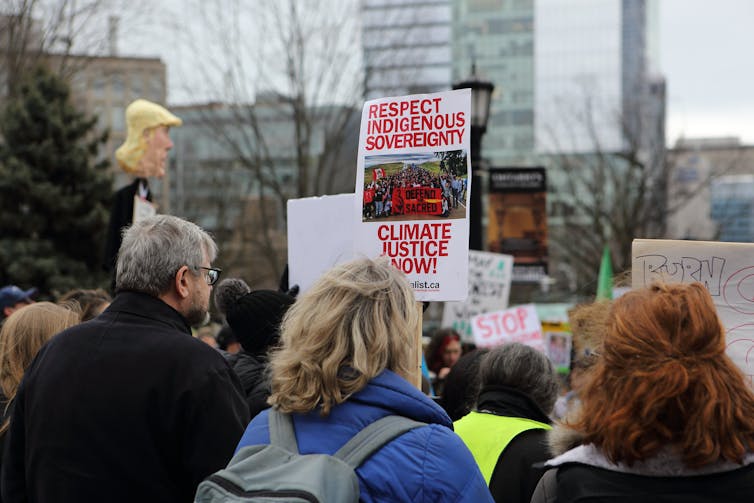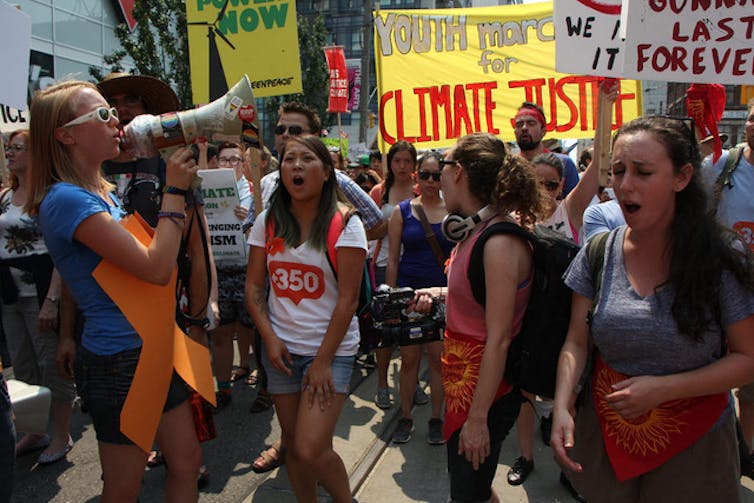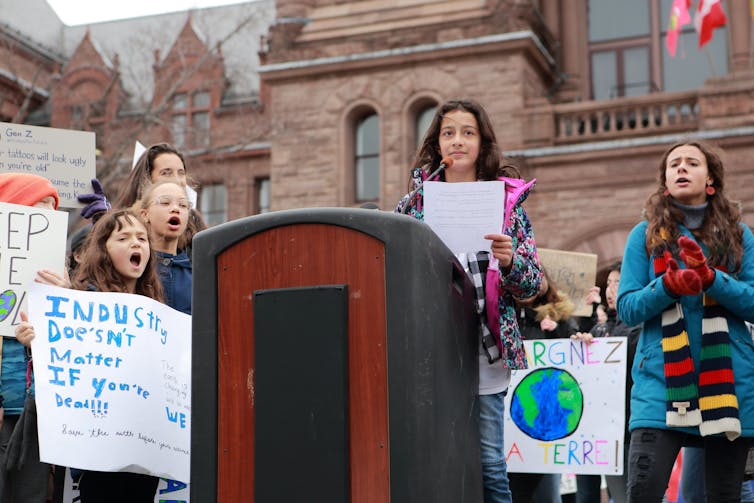Joe Curnow, University of Manitoba
In a time of climate catastrophe, after record-breaking temperatures scorched many parts of the world this summer and a devastating hurricane recently battered the Bahamas, school climate strikes are back.
A week of student-led global days of action is planned between Sept. 20 and 27. Young people skipping school to protest climate inaction in #Fridaysforfuture protests began last August when Greta Thunberg, now 16, sat outside the Swedish parliament for three weeks. Following her lead, young people have been walking out of school — some of them calling for “system change, not climate change.”
For those of us who have been analyzing climate activism, this is an important move toward a politicized generation that understands climate change is the greatest threat to our collective future.
Youth climate activists and academics
Our activist research collaborative, the RadLab based at the University of Manitoba, is made up of both youth climate activists and academics.
We have worked together over the last five years to look at the learning in activism and analyze how young climate activists become politicized. We’ve studied the historic socio-cultural roots of the North American environmental movement, their ongoing legacy and lived experiences in today’s environmental activism.
We have found that high-profile mainstream environmental movements in the United States and Canada tend to see themselves as virtuous while not acknowledging that environmentalism grew out of racialized imperialist and colonial strategies of land expansion and protection.
For example, conservationism has been interconnected with alienating lands from Indigenous people. Indigenous communities and poor people have been removed, relocated and displaced to protect privileged leisure access to “nature,” or white settler economic interests.
High-profile mainstream environmental movements in Canada and the U.S. have often inadequately addressed or acknowledged this colonial and racialized history and analysis. They have often ignored environmental damage in Black communities, communities of colour and Indigenous communities. Black activists and activists of colour working in their communities have called their work environmental justice. Indigenous communities’ work related to environmentalism has been rooted in sovereignty advocacy; they have centred their relationships with lands, water and life that is “more than human.”

(Milan Ilnyckyj/Flickr)
Our research suggests climate activists involved in mainstream environmental movements are learning from broader environmental justice and Indigenous sovereignty movements and that some today are adopting this broader climate justice analysis.
They also don’t believe that people in power are looking out for their best interests and they are demonstrating that young people must have a hand in shaping the future.
Moving toward systemic approaches
University students have been organizing to demand that their schools divest from fossil fuel companies.
We researched the shifts some activists involved with University of Toronto’s fossil fuel divestment group (Fossil Free UofT) experienced when they moved toward more systemic approaches to addressing climate change. A few of those activists became the members of the RadLab Collective through this participatory action research project.
In the three years since the University of Toronto’s president rejected divestment, we have worked together to analyze the learning made possible through our environmental activism.
In our research process, we collected video of every meeting, rally and action that was part of the divestment campaign for two years and analyzed it. We found that the learning students experienced helped them to shift how they understood themselves so that they embraced an identity as environmentalists committed to climate justice.
Learning wasn’t just about ideas or new concepts in participants’ minds — it was about how they learned to participate and communicate together so that the space of planning, organizing and actions could become more equitable.
They began to engage in ways that reflected their emerging understanding that objectivity is a Euro-Western construct. They embraced the reality they were discovering: that knowledge could emerge through relationships and experiences. Such ideas are shared by feminist and Indigenous philosophies.
Learning scaled up
We charted how divestment activists moved from thinking of environmentalism narrowly, to thinking about it in its historic relationship to colonialism, racialization and capitalism. This thinking shifted what they believed was required of them as activists and who they felt accountable to.
Through research data analysis and informal conversation, group members identified the patterned practices of exclusion, which our research group analyzed. In our group, Black and Indigenous group members and members of colour initially had fewer opportunities for leadership and had their ideas affirmed by anyone in the group far less frequently. As members noticed and named this, they became politicized and worked to shift the dynamics.

(Andrew Kohan), Author provided
Through the process of naming racialized and gendered patterns in the group, the politics of the group shifted. Black and Indigenous group members and members of colour shared their experiences of racialization in an informal people-of-colour caucus, and later in the equity committee they established.
A similar process emerged around gender in the group. As women and non-binary people shared their experiences of being left out of discussions and decision-making, they identified the pattern, and worked together to change the group’s processes.
From these alternative spaces, group members became politicized and amplified each other’s voices. They changed their collective practices and ways of knowing so that their analysis came to shape the group’s overall lens more and more. And these changes shifted how members identified — they came to see themselves as “radicals.”
The learning that happened around race and gender in the group scaled up, so that they understood anti-colonial, racial and gender justice as important at all levels of the campaign.
This changed some of the demands of the group, as they moved to include Indigenous solidarity language around Free, Prior and Informed Consent
in their analysis.
They also examined the limitations and problems with land acknowledgements, and they and advocated for other anti-colonial campaigns on campus and across Canada, like work in Aamjiwnaang First Nation and Unist’ot’en.
Justice-centred policies
Our research suggests that many of today’s young activists are less willing to accept normalized, racialized, colonial and patriarchal dynamics in their groups. This includes the consequences of decades of predominantly white men’s leadership in environmental NGOs or their universities and in state policies.

(Milan Ilnyckyj/Flickr)
Our research team is continuing to analyze data that will help us understand how environmentalists learn about solidarity and justice, grounded in an awareness of the contradictions and limitations of solidarity.
We want to learn in order to support people willing and able to fight for justice-centred policies that will stop the worst of the climate crisis for all communities.
Sinéad Dunphy co-wrote this article as part of the RadLab, an ongoing activist research collaborative based at the University of Manitoba.
[ Like what you’ve read? Want more? Sign up for The Conversation’s daily newsletter. ]![]()
Joe Curnow, Assistant Professor of Education, University of Manitoba
This article is republished from The Conversation under a Creative Commons license. Read the original article.

